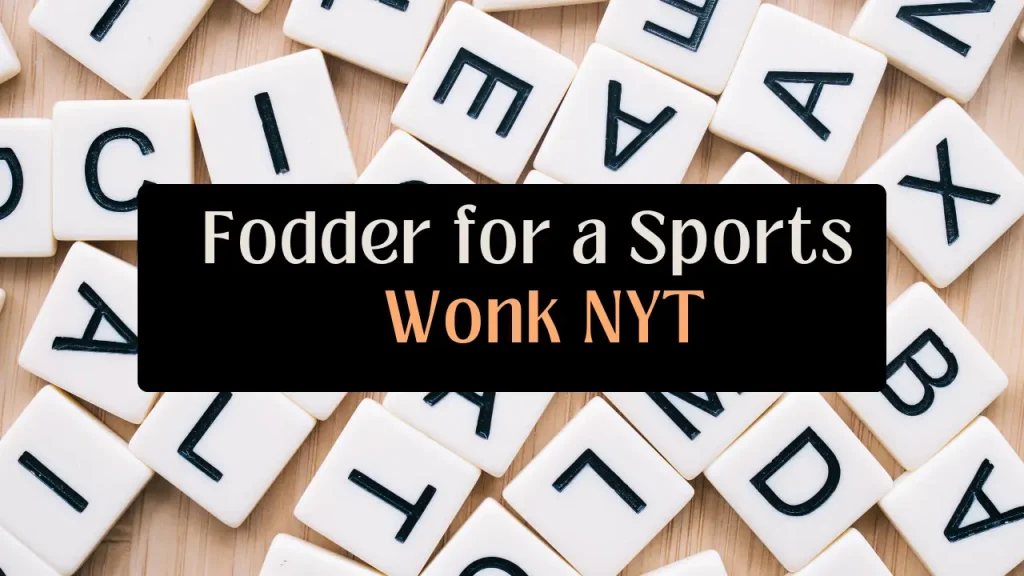
Fodder for a Sports Wonk NYT, Crossword puzzles are a popular pastime that engages people in solving clues that vary in difficulty. These clues can be straightforward or tricky, often requiring solvers to think outside the box.
A crossword clue is a hint or question that a puzzle solver uses to find the correct word or phrase to fill in the crossword grid.
“Fodder for a sports wonk nyt” is an example of such a clue, often appearing in The New York Times (NYT) crossword, which is known for its challenging and creative clues.
What Does “Fodder for a Sports Wonk NYT” Mean?
The phrase “fodder for a sports wonk” suggests material or content that would be particularly interesting to someone deeply knowledgeable about sports.
A “wonk” is someone who is highly interested in a specific subject, often to the point of obsession. In this context, a sports wonk is a person who is very knowledgeable about sports statistics, history, and trivia.
Therefore, “fodder” refers to information, data, or content that would engage a sports wonk’s interest.
What Are Some Possible Answers for “Fodder for a Sports Wonk NYT”?
While the exact answer can vary depending on the puzzle, common answers might include terms like “stats,” “trivia,” “records,” or specific references to sports history. Each of these could serve as “fodder” for someone deeply interested in sports.
The answer could also be more specific, referencing a particular event, statistic, or piece of sports history.
Why Do Crossword Puzzles Use Such Specific Clues?
Crossword puzzles, especially those in The New York Times, are designed to be intellectually stimulating and enjoyable. Clues like “fodder for a sports wonk NYT” require the solver to think carefully about the possible answers.
These clues often play on words, use puns, or reference niche knowledge, making them both challenging and satisfying to solve.
Crossword constructors aim to create clues that are both tricky and rewarding, adding to the puzzle’s overall appeal.
How to Approach Solving the Clue?
When faced with a clue like “fodder for a sports wonk nyt,” a good approach is to consider what kind of information a sports expert might be interested in.
This could include sports statistics, player histories, famous games, or even inside jokes that only a true sports fan would understand.
The answer is likely something that encapsulates this specialized knowledge, making the puzzle more challenging but also more rewarding when solved.
What Are Common Strategies for Solving Tough Crossword Clues?
- Think About the Context: Consider the clue in the context of the entire puzzle. Sometimes, neighboring answers can provide hints that help you solve tricky clues.
- Look for Wordplay: Many crossword clues use puns, double meanings, or other forms of wordplay. Thinking creatively can help unlock the answer.
- Consider the Length of the Answer: The number of squares in the crossword grid can give you an idea of the word length, which can narrow down your possibilities.
- Use Process of Elimination: If you’re stuck, try filling in other clues you know, and use the letters you’ve already placed in the grid to guide you to the answer.
Why Do People Enjoy Crossword Puzzles?
Crossword puzzles, like those in The New York Times, provide a mental challenge that many find enjoyable. They allow solvers to use their knowledge and reasoning skills to find the correct answers.
The satisfaction of solving a difficult puzzle, especially one with tricky clues like “fodder for a sports wonk nyt,” is a major part of the appeal.
Puzzles also offer a way to relax and unwind while still keeping the brain engaged.
How Can One Improve at Solving Crossword Puzzles?
- Practice Regularly: The more puzzles you solve, the better you’ll get at recognizing common clues and answers.
- Expand Your Knowledge: Reading about different topics, especially those that often appear in crossword puzzles like sports, literature, and history, can give you an edge.
- Work with Others: Solving puzzles with friends or family can introduce you to different ways of thinking about clues.
- Learn Common Clue Patterns: Certain types of clues appear frequently in crosswords. Learning these patterns can help you solve puzzles more quickly.
What Are the Benefits of Solving Crossword Puzzles?
Crossword puzzles offer several benefits, including:
| Benefit | Description |
| Mental Exercise | Solving puzzles keeps the brain active, which can improve memory and cognition. |
| Learning New Words | Puzzles introduce new vocabulary and phrases, enhancing language skills. |
| Stress Relief | Focusing on a puzzle can be a calming activity, helping to reduce stress. |
| Sense of Achievement | Completing a puzzle, especially a challenging one, provides a feeling of success. |
| Improved Problem-Solving | Regular practice can improve problem-solving skills and critical thinking. |
What Makes The New York Times Crossword Special?
The New York Times crossword is considered one of the most prestigious and challenging puzzles in the world. It is known for its clever clues, diverse themes, and a wide range of difficulty levels.
The puzzle has a rich history and is a daily ritual for many enthusiasts. Clues like “fodder for a sports wonk nyt” showcase the creativity and complexity that make the NYT crossword unique.
Solving it is not just about filling in the grid, but about engaging with a rich tradition of wordplay and intellectual challenge.
Conclusion
“Fodder for a sports wonk nyt” encapsulates the kind of clue that makes crossword puzzles both challenging and enjoyable. It requires solvers to think deeply, use their knowledge, and engage with the puzzle on a higher level.
This clue, like many in the NYT crossword, is designed to push solvers to their limits, offering a sense of satisfaction when the correct answer is finally revealed.
For sports wonks and puzzle enthusiasts alike, this kind of clue represents the ultimate mental challenge.


